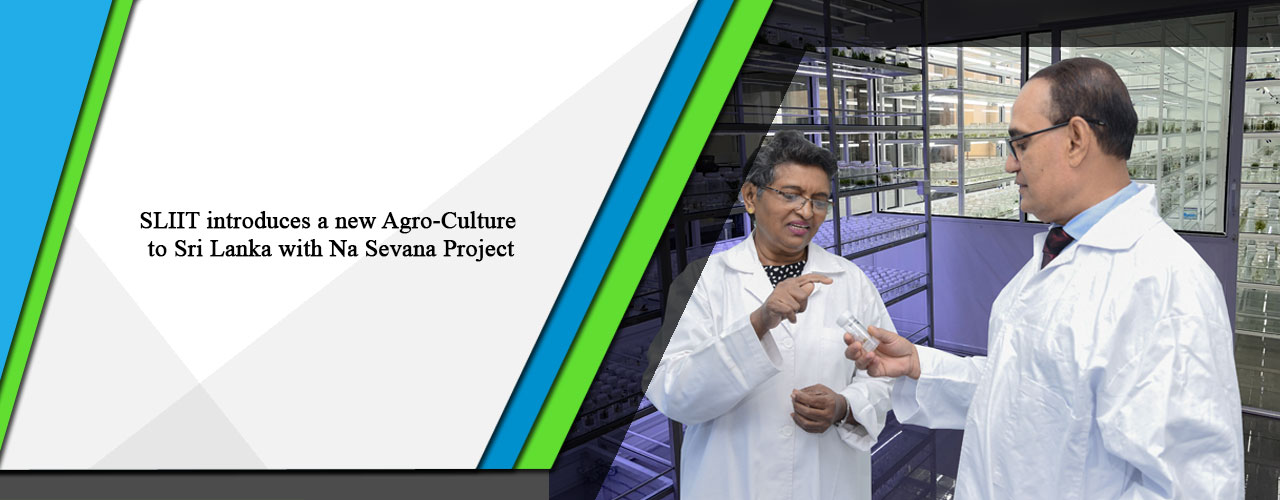SLIIT introduces a new Agro-Culture to Sri Lanka with Na Sevana Project
Ada Derana: Cutting-edge technology will be spliced into agro and dairy farming at the Na Sevana model farm, a green project spearheaded by the Sri Lanka Institute of Information Technology (SLIIT), in partnership with Ven. Kirinde Assaji Thero, Chief prelate of the Hunupitiya Gangaramaya Temple.
The Na Sevana, a pilot project to be replicated across the island, will support a scientific method toward increasing food production to meet the urgent needs of the country.
“The learnings from this project will be available for everyone so that they can increase productivity in both agro and dairy farming which will bring about a more sustainable form of life and livelihoods to the people of Sri Lanka,” says Prof. Colin Peiris, Director – Academic Development and Quality Assurance of SLIIT. The ‘Na Sevena’ project, which kicked off at the beginning of this year, is a green farming facility being developed on a 112-acre plot of existing farmland in Meegahajandura, Sooriyawewa, which belongs to the Gangarama temple.
The Agro economic project, which will eventually benefit over 725 farming families in the Meegahajandura area will introduce modern agricultural methods and high-tech horticulture farming techniques to residents in phases. Around 25 families will be identified during the first phase to be trained in the new modern technology.
The 112-acre farm is neatly divided into 9 sections i.e. 60 acres for mango cultivation, 3 acres for pepper, 5 acres for Guava, 15 acres of banana, 1 acre for lemongrass, and more for mixed crops. It will also house a dairy farm, eco-tourism unit, a plant nursery and 5000 square feet of greenhouse facilities. The modern farming concepts adopted by SLIIT facilitates research in biotechnology and automation which will be used by the Institute’s students in their research work.
In the overall plan, the model farm intends to be completely self-sustainable with end-to-end production and marketing of produce fine-tuned to the minutest detail. Quality farming inputs, technical support and market expertise will be provided to both agri and dairy farmers in the area, with the aim of increasing their farm and off-farm incomes. The Dairy unit of Na Sevana will be the resource center for producing quality calves, suited for the area and provide consultation on introducing suitable fodder and concentrates. Existing and potential dairy farmers will receive training on modern methods and the use of Artificial Insemination (AI) for running efficient operations. A qualified technician proficient in AI will conduct the training and be available to the farmers for consultation.
“The Na Sevana green farm project is a notable accomplishment of our SLIIT Business School and Faculty of Humanities and Sciences. For an educational institute, maintaining a greenhouse is an uphill task because every element should be well integrated and monitored, so that greenhouse activities are streamlined, to artificially create a conducive environment for plants to grow. We have connected with leading agro companies to get the highest quality seeds for hydroponic cultivation and the farm’s produce is organic. Students have already nursed a tomato cultivation, high-quality lettuce species and different species of capsicum. Our lecturers from the Faculty of Computing are closely monitoring external factors through a specialized system which enables us to monitor temperature, humidity, light, and other critical factors inside the greenhouse,” says Prof. Colin Peiris.
Professor Sriyani Peiris added that students are currently engaged in tissue culture, an effective technology for small-scale farmers as well as larger-scale plant propagation where plant matter is gathered from a mother plant and used to grow thousands of perfectly identical plants. SLIIT has already secured a location to establish a full-fledged Tissue Culture Laboratory in Na Sevana.
Once complete, the Na Sevana project will have a Milk Collection and Processing Unit, as well as Fruit and Vegetable Collection and Processing Centers. The processing centers which will be phase 2 of the projects, when factories would be established for the production of dairy products like curd, yoghurt and fruit drinks, jams, cordials, dehydrated fruits, vegetables and herbs as well as other food products made from locally sourced vegetables and fruit.
A unit for breeding and producing ornamental fish is also being developed with selected farmers as out-growers. SLIIT will provide technical advice and financial links for farmers to build their farm fish tanks and get their systems operational.
SLIIT Business School will do market research and explore avenues such as supermarket chains, export processing companies, export markets, networks of locals living overseas, and export processing companies to market fresh farm produce, organic and processed products as well as ornamental fish.
OSL take:
Sri Lanka’s agriculture industry has presented a host of new business/investment opportunities given the growing demand for food production to meet the country’s demand. The ongoing crisis situation in the country has also created a risk of food security thereby opening business opportunities in the food production and distribution sectors. Sri Lankan authorities have already encouraged citizens to engage in the cultivation of food crops while some local government bodies have launched community cultivation programmes to increase food production. The country’s private sector has also launched similar programnes. The increasing demand for food production, distribution and minimizing wastage has provided a lucrative business/investment opportunities for foreign businesses and they could also look at forming partnerships or joint ventures with local businesses.
| Article Code : | VBS/AT/12072022/X_7 |

